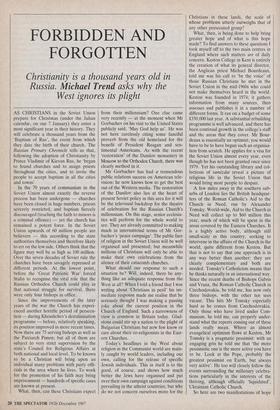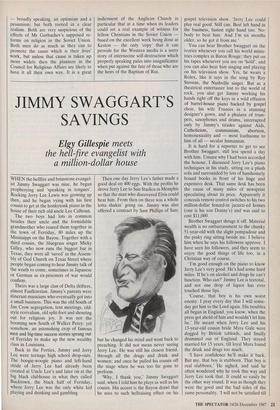FORBIDDEN AND FORGOTTEN
Christianity is a thousand years old in West ignores its plight
AS CHRISTIANS in the Soviet Union prepare for Christmas (under the Julian calendar, on our 7 January) they enter a most significant year in their history. They will celebrate a thousand years from the `Baptism of Rus', the event from which they date the birth of their church. The Russian Primary Chronicle tells us that, following the adoption of Christianity by Prince Vladimir of Kievan Rus, he 'began to found churches and to assign priests throughout the cities, and to invite the people to accept baptism in all the cities and towns'.
In the 70 years of communism in the Soviet Union almost exactly the reverse process has been undergone — churches have been closed in huge numbers, priests severely restricted, and baptism fiercely discouraged (teaching the faith to minors is a criminal offence) — yet the church has remained a potent force. In the Soviet Union upwards of 60 million people are believers — this according to the state authorities themselves and therefore likely to err on the low side. Others think that the figure may well be as high as 100 million. Over the seven decades of Soviet rule the churches have been savagely repressed at different periods. At the lowest point, before the 'Great Patriotic War' forced Stalin to recognise the vital role that the Russian Orthodox Church could play in that national struggle for survival, there were only four bishops in office.
Since the improvements of the later years of the war the Church has experi- enced another horrific period of persecu- tion — during Khrushchev's destalinisation programme — before, relatively speaking, its position improved in more recent times. Now there are 75 serving bishops as well as the Patriarch Pimen; but all of them are subject to very strict supervision by the state's Council for Religious Affairs at both national and local level. To be known to be a Christian will bring upon an individual many problems with party offi- ciali in the area where he lives. To work for the promotion of his faith may bring imprisonment — hundreds of specific cases are known at present.
What, then, can these Christians expect from their millennium? One clue came very recently — at the moment when Mr Gorbachev on his visit to the United States publicly said, 'May God help us'. He was not here carelessly citing some fanciful proverb from the old homeland for the benefit of President Reagan and sen- timental Americans. As with the recent `restoration' of the Danilov monastery in Moscow to the Orthodox Church, there was clearly method in it.
Mr Gorbachev has had a. tremendous public relations success on American tele- vision: he now knows how to get the best out of the Western media. The restoration of the Danilov also lies at the heart of present Soviet policy in this area for it will be the televisual backdrop for the theatre of celebration for the Russian Church's millennium. On this stage, senior ecclesia- tics will perform for the whole world to see. They are already committed to making much in international terms of Mr Gor- bachev's 'peace campaign'. The public face of religion in the Soviet Union will be well organised and presented; but meanwhile millions of Christians will only be able to make their own celebrations from the silence of their catacomb churches.
What should our response to such a situation be? Will, indeed, there be any- thing like an adequate response from the West at all? When I told a friend that I was writing about 'Christians in peril' his im- mediate response made me realise that he seriously thought I was making a passing joke about the current position in the Church of England. Such a narrowness of view is common in Britain today. Glad- stone could stir up a nation to the plight of Bulgarian Christians but now few know or care about their co-religionists in the East- ern Churches.
Today's headlines in the West about religion in the Communist world are main- ly caught by world leaders, including our own, calling for the release of specific Jewish individuals. This in itself is to the good, of course, and shows how much better the Jews have organised and put over their own campaign against conditions prevailing in the atheist countries; but why do we not concern ourselves more for the Christians in these lands, the scale of whose problems utterly outweighs that of any other persecuted group?
What, then, is being done to help bring greater hope and of what is this hope made? To find answers to these questions I took myself off to the two main centres in England where such matters are of daily concern. Keston College in Kent is entirely the creation of what its general director, the Anglican priest Michael Bourdeaux, told me was his call to 'be the voice' of those Russian Christians he met in the Soviet Union in the mid-1960s who could not make themselves heard in the world. Keston was founded in 1974; it gathers information from many sources, then assesses and publishes it in a number of different forms. It ran on a budget of some £350,000 last year. A substantial rebuilding programme is well advanced, and there has been continual growth in the college's staff and the areas that they cover. Mr Bour- deaux is essentially an optimist; you would have to be to have begun such an organisa- tion from scratch. He applies for a visa for the Soviet Union almost every year, even though he has not been granted once since 1979. Yet his outstanding library and col- lections of samizdat reveal a picture of religious life in the Soviet Union that would bring most people to despair.
A few miles away in the southern sub- urbs of London lies the British headquar- ters of the Roman Catholic's Aid to the Church in Need, run by Alexander Tomsky. World-wide, Aid to the Church in Need will collect up to $60 million this year, much of which will be spent in the areas covered by the Eastern Churches. It is a highly active body, although still small-scale in this country, seeking to intervene in the affairs of the Church in the world, quite different from Keston. But that is not to say that one approach is in any way better than another: they are clearly complementary and both are needed. Tomsky's Catholicism means that he thinks naturally in an international way. Since the recent deaths of Bishops Gabris and Vrana, the Roman Catholic Church in Czechoslovakia, he told me, has now only three bishops, with the other ten sees vacant. This hits Mr Tomsky especially hard as he comes from Czechoslovakia. Only those who have lived under Com- munism, he told me, can properly under- stand what the reports coming out of these lands really mean. Where an almost evangelical optimism flows at Keston, Mr Tomsky is a pragmatic pessimist: with an engaging grin he told me that 'the more pessimistic one is the more active you have to be. Look at the Pope, probably the greatest pessimist on Earth, but always very active'. He too will closely follow the events surrounding the millenary celebra- tions particularly in the interests of the thriving, although officially 'liquidated', Ukrainian Catholic Church.
So here are two manifestations of hope — broadly speaking, an optimism and a pessimism; but both rooted in a clear realism. Both are very suspicious of the effects of Mr Gorbachev's supposed re- forms on religion in the Soviet Union. Both men do as much as they can to promote the cause which is their lives' work, but unless that cause is taken up more widely then the planners in the Council for Religious Affairs are likely to have it all their own way. It is a great indictment of the Anglican Church in particular that at a time when its leaders could set a real example of witness for fellow Christians in the Soviet Union based on the excellent work being done at Keston — the only 'copy' that it can provide for the Western media is a sorry story of internecine self-destruction which properly speaking pales into insignificance when put against the fate of those who are the heirs of the Baptism of Rus.











































































































 Previous page
Previous page